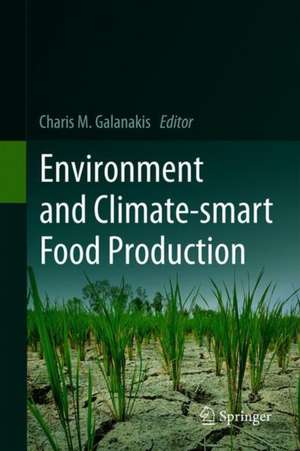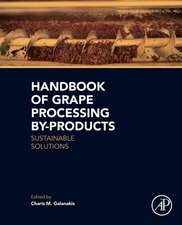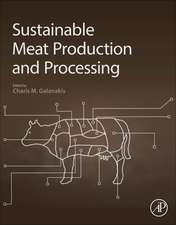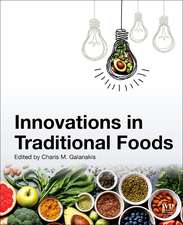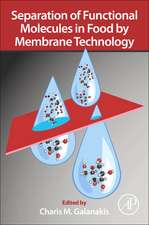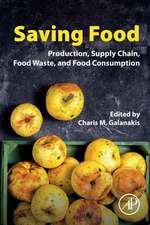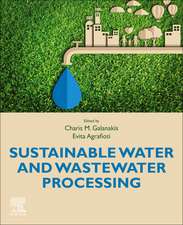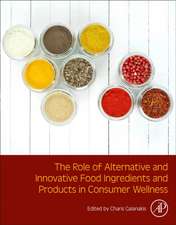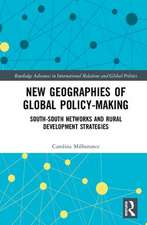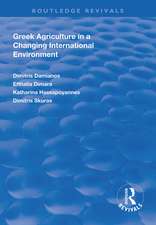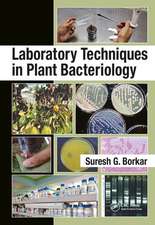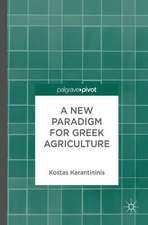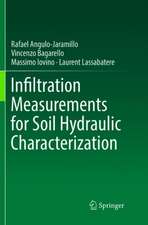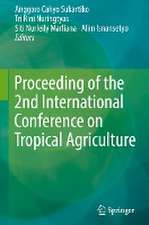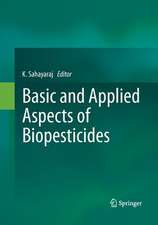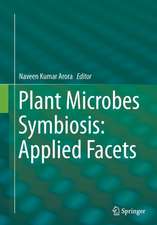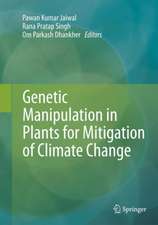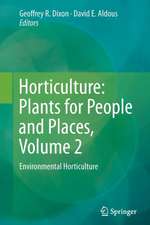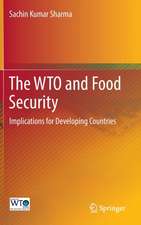Environment and Climate-smart Food Production
Editat de Charis M. Galanakisen Limba Engleză Hardback – 10 noi 2021
Few books on the market integrate environment studies and climate-smart food production. This book fills the knowledge gap by covering all the relevant aspects in one reference: starting with microclimate management, climate change and food systems, and resilience of mixed farming and agroforestry systems, chapters address agricultural soil management, integrated water management in small agricultural catchments, citizen-driven food system approaches in cities, and ICT-enabled agri-food systems. By focusing on the most recent advances in the field while analyzing the potential of already applied practices, this book can serve as a handbook for regulators and researchers looking to understand all aspects of food production and distribution in this changing environment.
| Toate formatele și edițiile | Preț | Express |
|---|---|---|
| Paperback (1) | 1552.32 lei 6-8 săpt. | |
| Springer International Publishing – 11 noi 2022 | 1552.32 lei 6-8 săpt. | |
| Hardback (1) | 1557.62 lei 6-8 săpt. | |
| Springer International Publishing – 10 noi 2021 | 1557.62 lei 6-8 săpt. |
Preț: 1557.62 lei
Preț vechi: 1899.53 lei
-18% Nou
Puncte Express: 2336
Preț estimativ în valută:
298.09€ • 310.06$ • 246.09£
298.09€ • 310.06$ • 246.09£
Carte tipărită la comandă
Livrare economică 14-28 aprilie
Preluare comenzi: 021 569.72.76
Specificații
ISBN-13: 9783030715700
ISBN-10: 3030715701
Pagini: 427
Ilustrații: X, 427 p. 65 illus., 62 illus. in color.
Dimensiuni: 155 x 235 mm
Greutate: 0.82 kg
Ediția:1st ed. 2022
Editura: Springer International Publishing
Colecția Springer
Locul publicării:Cham, Switzerland
ISBN-10: 3030715701
Pagini: 427
Ilustrații: X, 427 p. 65 illus., 62 illus. in color.
Dimensiuni: 155 x 235 mm
Greutate: 0.82 kg
Ediția:1st ed. 2022
Editura: Springer International Publishing
Colecția Springer
Locul publicării:Cham, Switzerland
Cuprins
1-Microclimate management: From traditional agriculture to livestock systems in tropical environments
2-Climate-smart and agro-ecological farming systems of smallholder farmers
3-The telecoupling approach to the Global Food System and Climate Change Regime: the pivotal role of Brazil and China
4-Genetic Resources
5-PLANT ADAPTATION TO ENVIRONMENTAL STRESS: DROUGHT, CHILLING, HEAT, AND SALINITY
6-Innovations in Plant Variety Testing with Entomological and Statistical Interventions
7-Global Resource Flows in the Food System
8-Vertical Farming: An AI-based Micro-System with Economic Data
9-Challenges and Opportunities of Digital Technology in Soil Quality and Land Management Research 10-High-Quality Fertilizers from Biogas Digestate
11-Citizen-driven food system approaches in cities
12-ICT-enabled agri-food systems
2-Climate-smart and agro-ecological farming systems of smallholder farmers
3-The telecoupling approach to the Global Food System and Climate Change Regime: the pivotal role of Brazil and China
4-Genetic Resources
5-PLANT ADAPTATION TO ENVIRONMENTAL STRESS: DROUGHT, CHILLING, HEAT, AND SALINITY
6-Innovations in Plant Variety Testing with Entomological and Statistical Interventions
7-Global Resource Flows in the Food System
8-Vertical Farming: An AI-based Micro-System with Economic Data
9-Challenges and Opportunities of Digital Technology in Soil Quality and Land Management Research 10-High-Quality Fertilizers from Biogas Digestate
11-Citizen-driven food system approaches in cities
12-ICT-enabled agri-food systems
Notă biografică
Dr. Charis Galanakis is the executive director of Galanakis Laboratories, a chemical analysis and innovation center founded in 1925. He has over 15 years of experience analyzing wine, food, beverages and environmental samples as well as consulting for related industries and local producers. Dr. Galanakis is also the founder of the Food Waste Recovery Group, based in Vienna, and has served as Deputy National Representative of Greece in the ISEKI Food Association since 2015.
Textul de pe ultima copertă
Agriculture and food systems, forestry, the marine and the bio-based sectors are at the very heart of the climate change crisis. Evidence on climate change reveals that it will affect farming first, through changes to rainfall regimes, rising temperatures, the variability and seasonality of the climate and the occurrence of more frequent extreme events (heatwaves, droughts, storms and floods). In addition to findings ways to mitigate greenhouse gas emissions, farmers will need to develop farming systems resilient to fluctuating environmental and socioeconomic conditions. It is thus a great challenge to support ambitious climate targets while satisfying the needs for food, feed, bio-based products and energy for a global population projected to reach 10 billion by 2030.
Few books on the market integrate environment studies and climate-smart food production. This book fills the knowledge gap by covering all the relevant aspects in one reference: starting with microclimate management, climate change and food systems, and resilience of mixed farming and agroforestry systems, chapters address agricultural soil management, integrated water management in small agricultural catchments, citizen-driven food system approaches in cities, and ICT-enabled agri-food systems. By focusing on the most recent advances in the field while analyzing the potential of already applied practices, this book can serve as a handbook for regulators and researchers looking to understand all aspects of food production and distribution in this changing environment.
Few books on the market integrate environment studies and climate-smart food production. This book fills the knowledge gap by covering all the relevant aspects in one reference: starting with microclimate management, climate change and food systems, and resilience of mixed farming and agroforestry systems, chapters address agricultural soil management, integrated water management in small agricultural catchments, citizen-driven food system approaches in cities, and ICT-enabled agri-food systems. By focusing on the most recent advances in the field while analyzing the potential of already applied practices, this book can serve as a handbook for regulators and researchers looking to understand all aspects of food production and distribution in this changing environment.
Caracteristici
Addresses agricultural soil management, integrated water management in small agricultural catchments, citizen-driven food system approaches in cities, and ICT-enabled agri-food systems
Focuses on the most recent advances in sustainable food production, while analyzing the potential of already applied practices
Integrates environment and climate-smart food production by covering all relevant aspects in one reference
Focuses on the most recent advances in sustainable food production, while analyzing the potential of already applied practices
Integrates environment and climate-smart food production by covering all relevant aspects in one reference
